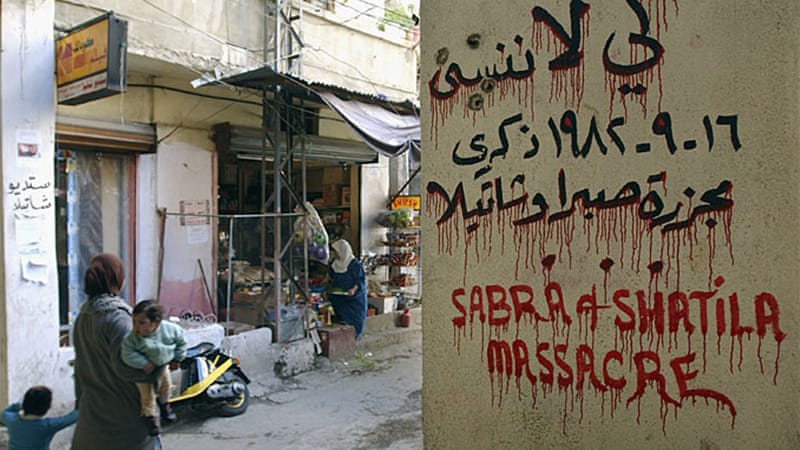Learn about the history of the Palestinian struggle for freedom, equality and justice by exploring major events in the history of their oppression on this day of the year.
16 September
 ISRAEL ARMY AND THE MASSACRE OF SABRA AND SHATILLA
ISRAEL ARMY AND THE MASSACRE OF SABRA AND SHATILLA
On this day in 1982, the infamous massacre of over 1,000 Palestinians in Sabra and Shatilla Refugee Camp in Beirut, Lebanon was in its third day. The Israeli army controlled the camp perimeter, gave its allies in the Christian Falange militia entry to the camp and provided lighting at night by firing flares to help the killers locate victims. A large but still unknown number were killed, probably thousands of Palestinian and Lebanese civilians whom the US Govt had undertaken to protect.
دور الجيش الإسرائيلي في مذبحة صبرا وشتيلة
سبتمبر16
في مثل هذا اليوم من عام 1982، كانت المذبحة سيئة السمعة التي كان ضحيتها أكثر من 1000 فلسطيني في مخيم صبرا وشاتيلا للاجئين في بيروت، لبنان، في يومها الثالث. سيطر الجيش الإسرائيلي على محيط المخيم، وسمح لحلفائه في مليشيا فالانج المسيحية بالدخول إلى المخيم وزوَّد الإضاءة في سماء المخيم ليلاً بإطلاق قنابل مضيئة لمساعدة القتلة في تحديد مكان الضحايا. قُتل عدد كبير ولكن غير معروف، ربما الآلاف من المدنيين الفلسطينيين واللبنانيين الذين تعهدت الحكومة الأمريكية بحمايتهم.
Then about 4pm, an Israeli officer came out. He was wearing dark glasses and said in Arabic: ‘What are you all waiting for?’ He said there was nobody left, that everyone had gone. There were Israeli trucks moving out with tarpaulin over them. We couldn’t see inside. And there were jeeps and tanks and a bulldozer making a lot of noise. We stayed there as it got dark and the Israelis appeared to be leaving and we were very nervous. But then when the Israelis had moved away, we went inside. And there was no one there. Nobody. I had been only three years married. I never saw my husband again.”
West turned blind eye to Israel's involvement in Sabra and Shatila 'slaughter'
Classified documents released by the British government suggest the massacres of Palestinians in Lebanon's Sabra and Shatila camps in 1982 did little to change the thinking of the international actors in the conflict.
Between 800 and 3,500 people were killed - mostly older men, women and children - by Israeli-backed, far-right Christian Phalangist militias between September 16 and 18, 1982. The Israeli army had invaded Lebanon in June of that year in an attempt to remove the Palestinian Liberation Organisation and its leader, Yasser Arafat, and had succeeded in forcing their departure a week earlier.
But the Israeli military remained to find and expel any Palestinian fighters still in Beirut and had set up encampments outside the Palestinian refugee camps in Sabra and Shatila. As the Phalangist militiamen - also looking to flush out Palestinians - rampaged through the narrow alleys of the camps at night, Israeli soldiers fired flares to light their way.
The bloodshed shocked the world and sparked a wave of criticism that would eventually force Israel's withdrawal...
Margaret Thatcher, the British prime minister, released an early statement calling the massacres an "act of sheer barbarism which must bring total condemnation on its perpetrators". In private communications, Francis Pym, the British foreign secretary, described the killings as "appalling" and a "slaughter". But Pym also seemed to absolve Israel of direct responsibility for massacres.
4-minute video - the UN called the Israeli massacre a 'genocide'
